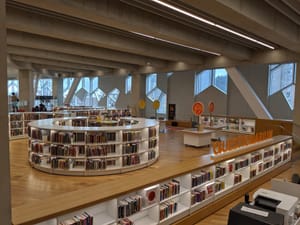I was reading Benedict Anderson’s Imagined Communities on a flight home the other day. A major part of his argument is that publishing – of books, newspapers, and so on – played an important role in creating a shared identity across geographically distributed communities, which in turn was important in the rise of national self-identity. I was struck by the following:
In a rather special sense the book was the first modern-style mass-produced industrial commodity. The sense I have in mind can be shown if we compare the book to other early industrial products such as textiles, bricks, or sugar. For these comodities are measured in mathematical amounts (pounds or loads or pieces). A pound of sugar is simply a quantity, a convenient load, not an object in itself. The book, however – and here it prefigures the durables of our time – is a distinct, self-contained object, exactly reproduced on a large scale.
It was this exact reproduction which allowed libraries to develop based on shared processing and other standard characteristics. Indeed, Anderson notes “small wonder that libraries, personal collections of mass-produced commodities, were already a familiar sight, in urban centres like Paris, by the sixteenth century century”.
Many library practices depend on this mass production element, and a supporting industry has developed around it. Library buildings and shelving are constructed in anticipation of predictably sized volumes. The efficiencies of the shared cataloging model arose from the fact that libraries were describing the same books which were widely distributed. Business processes (circulation, acquisition) are standardised enough for interchangable software applications to exist. And so on. In modern parlance, an ecology of services exists around the commoditized book platform.
What has happened is that ‘library automation’ and to some extent library structures have been built around these well-understood processes.
Now, one of the major things that has happened in recent years is that libraries are having to manage much more than these standardised items. Many of the resources being managed are unique or ‘special’ (research and learning materials, websites, digitization of rare materials). Processes are not yet standardised. Resources require special attention. This means that this activity is expensive and happens outside of the routine.
What is happening with licensed materials is also interesting in this regard. A set of agreed processes is emerging through resolution and ERM services. These are not yet in their final form, but are mature enough for a variety of products to have appeared in recent years to meet similar needs.
Related entries:



